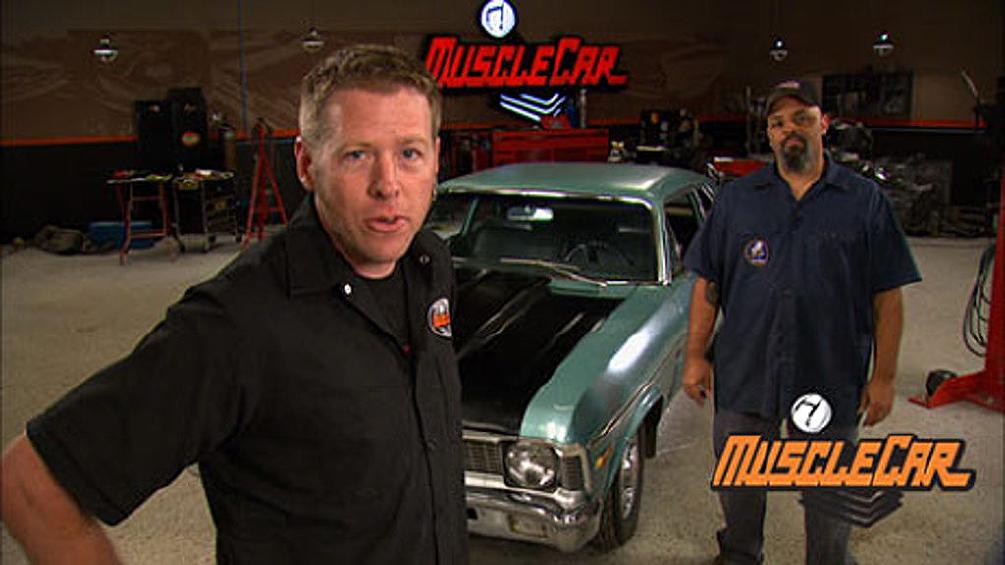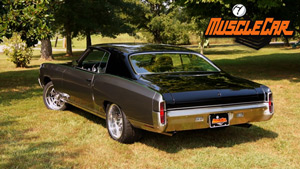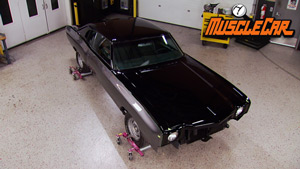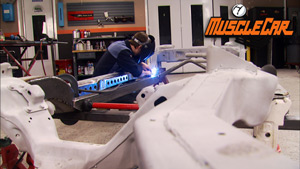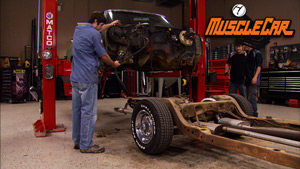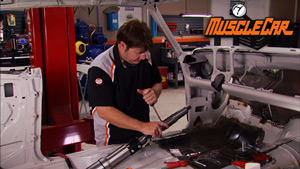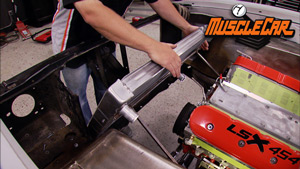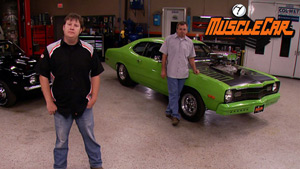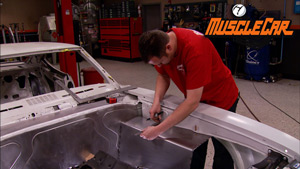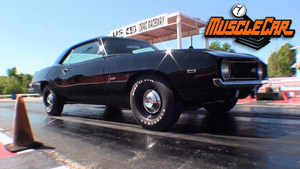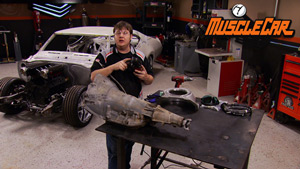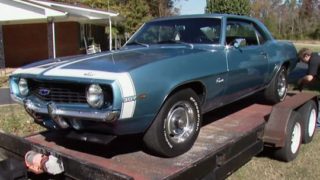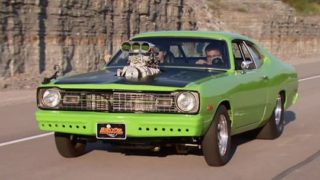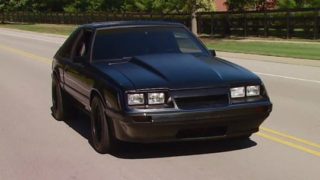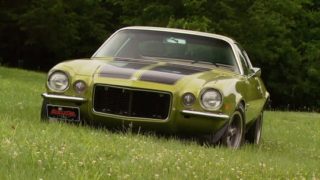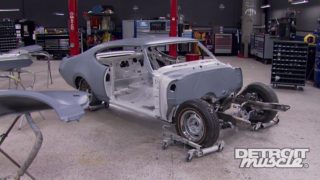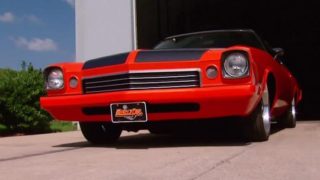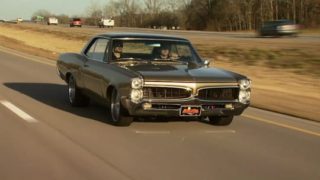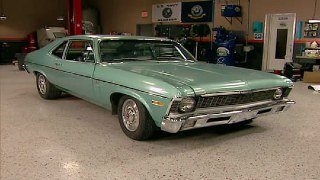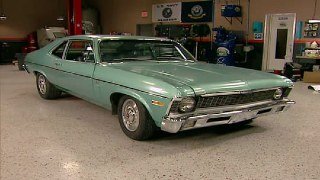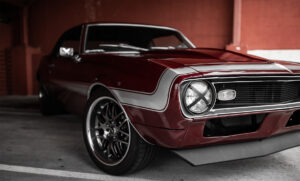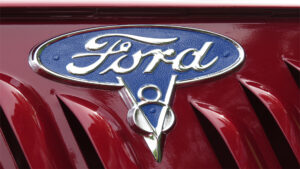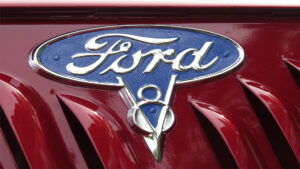MuscleCar Builds
Want more content like this?
Join the PowerNation Email NewsletterParts Used In This Episode
Auto Body Color & Supply Co.
Rust defender, acrylic enamel hardener, 1 qt. of 9300, purple hookit file pads, maroon general use pad, grey general use pad, mixing color.
Barry Grant
Carburetor.
Barry Grant
Fuel Pump.
Cherry Bomb
Cherry Bomb turbo mufflers.
Chevrolet Performance
GM Performance 6.0 liter LS2
Classic Industries
Fuel Tank.
Classic Industries
Shock relocation bracket.
Coker Tire
15 X 4 CORVETTE RALLY & 15 X 8 CORVETTE RALLY.
Comp Cams
XIM controller for 58 tooth crank trigger.
Detroit Speed & Engineering
Front tubular control arms.
Detroit Speed & Engineering
Serpentine belt for LS motor.
Goodmark Industries
Steel cowl induction hood.
Holley
LS series header flanges and exhaust bends and collectors.
Keisler Engineering, Inc.
Hydraulic throwout bearing assembly.
Master Power Brakes
Front disc brake upgrade complete with power booster and master cylinder.
McLeod Industries
Flywheel, clutch, and bellhousing.
Mickey Thompson
235/60R15 E/T STREET RADIAL.<br>
26 X 6.00 R 15 SPORTSMAN S/R RADIAL.
Moroso
Adjustable competition shock,adjustable pinion snubber.
Rockland Standard Gear (RSG)
T-56 manual transmission.
Summit Racing
Eaton posiunit.
Summit Racing
Electric exhaust slider.
Summit Racing
RICHMOND 4.11
Summit Racing
Superior axles.
Tennsmith
Hand brake, slip rolls, shears and notchers.
Episode Transcript
Today on muscle car. The story of old blue hair, how she went from Snoozer to Sleeper. Plus, do it yourself, prep for a facelift paint job and a wild ride in a first year trans
am.
Today in the shop, we're going to talk about one of my personal favorites this 1970 Chevy Nova that we affectionately call old blue hair and something that you guys need to keep in mind
looks can be deceiving. You're right. Lou now keeping a car looking stock but running like a beast can be enough work for both Dr
Jekyll and Mr Hyde.
Our Nova started out as a one owner car literally driven just 17 miles a week by a little old lady, hence the name old blue hair. And this thing will end up looking just like it did when she drove it
with the same paint, same stands hell,
the same hubcaps.
But all that will hide that 440 Horse V8 and a six speed tranny.
Now, the first thing done was to dump the stock six cylinder to make room for a brand new 6 L Ls two small block.
It makes 412 ft pounds of torque and 440 horse right out of the crate.
And that with just a 750 carb on top
before we can wedge this baby in. We had the bolt in our new Rockland T 56 6 speed tranny.
After our first test fit, we decided to stock tranny hump at
the go
plenty
of room. Now,
we moved our motor mounts to cradle our LS two. But after all that, we still had to break out the plasma cutter to make enough room for our new drive
with the tranny in place. A new cross member was made by cutting a stock one into three pieces.
Now would be a good time to address old blues, 36 year old sagging suspension because we all know the older you get
things start to sag.
We added upper and lower control arms from Detroit speed and engineering. They're stronger, lighter and more adjustable than the old stock units. And they're made from 120 walls dom tubing.
After that master power brakes stepped up with a complete brake kit including a new master cylinder and brake booster.
Old blue hair was begging to get back on the road. So some new motor mounts were
fed up.
That was good, but they kept the over the counter headers from fitting. So it was time to make some starting with header,
phalanges from hooker headers.
Then using J bends, we cut them up, tacked them to fit,
then disassembled the whole thing and welded it up.
Now, the 58 tooth reluctant at GM went to on our LS Two
Fast decided to build us a prototype unit to fire the whole power plant.
But before we could unleash this baby's 412 ft pounds of torque, we needed to add some frame connectors. So we don't twist this old girl in half
two inch 65 wall tubing made the perfect base for the frame connectors.
They were installed, leaving access to the body mounts, then welded to the rocker panels to tie everything together.
This formed the new backbone of straightened out old blue hair.
Now we need to feed our engine.
So we added this big old Barry Grant fuel pump in the trunk
instead of choking that fuel delivery system down with a traditional regulator. We built in a loop system like on a modern day EF I set up with this system, we needed to run two grated lines. So we swapped out the stock fuel tank with a new one from classic industries, but we still needed to modify it for the second fuel line.
A serpentine system from Detroit Speed and engineering was added next, an aluminum radiator with an electric fan was dropped in
but to keep it disguised, we painted the front black
and with the fuel pressure set at eight P si, the new LS two was fired up for the first time.
Now with the engine running, things could move forward towards getting old blue hair ready for a new life as a sleeper.
And we'll show you the rest of that after the break
coming up, our sleeper Nova wakes up with some serious upgrades and get some street came.
Glad to see you guys made it back because today we're recapping one of my favorite projects this 70 Nova that we call old blue hair and now that we got you up to speed on how we got fired that LS two, we'll fill you in on how we got the rest of the chassis and the drive train prepped out to handle that extra power.
We decided to install an original GM 10 bolt rear end to take the sleeper to the next level. We added an eating limited slip differential. Our 411 ring opinion came from Richmond.
Now you saw the disc brake conversion on the front of old blue hair, but the drums are staying out back
with a little upgrading.
After that, we added some 28 Splint evolution series axles from Summit. They're 35% stronger than stock axles that came out of this old girl. These won't break no matter what we throw at them.
The new rear end has the correct purchase for multi leaf springs. So some new ones had to be made. Yeah, because it's 1970 Nova kid with Mono leaf springs.
They're not used to the kind of abuse. We're gonna put them through.
So we're gonna wake up this old Sleeping beauty here
starting with stock replacement springs for a second generation Nova.
They were disassembled and a two inch cut was taken out of the stack.
Next, the ends were rounded off with a grinder, creating a bevel to help the new modified spring slide better.
We reconstructed our new spring packs with sea clams mounted our new largest center pins with a little help from the plasma cutter
fire
fire
and finished up the assembly with factory style claims.
Then we tax them for extra strength.
The last piece of the puzzle to fall in place was competition. Engineering's three way adjustable drag shots, but the shock mounts had to be moved to the inside of the chassis to accommodate the bigger tires.
We welded in some steel tubing to mount our shocks. And after figuring out where they needed to be connected, we drilled and added a bolt for our new shock mount.
Now with all that newfound power, it'd be a shame to choke it all down with a puny little exhaust, but there is a way around it cut outs.
You know, back in the day, you would have to manually undo the pipe covers to allow the exhaust to come straight out of the headers.
Now, we can add these electric cutouts from D MH performance where at the flip of a switch, this butterfly opens up, you got open exhaust
and with a switch that mounts under the dash,
be afraid, be very afraid.
Now, since we hid these cut outs underneath the car, we made some short turndowns to keep from cooking the floor.
The rest of the exhaust system was finished up by running 2.5 inch pipe out the back.
And given that LS two, its growl are cherry bombs, new vortex series mufflers. They're designed to be reversible so you can put them in any way you want.
And last but not least since our 70 nova will be a sleeper in the truest sense of the word. A little street camel was mandatory for this girl.
The 12 inch steel fly wheel, a mccloud LS series 100 clutch and a diaphragm style pressure play were added for more leverage.
This makes it easier to press in the clutch without affecting the clamping load.
Then we added a hydraulic clutch set up from K
was just to finish off. Our conversion from an automatic to a six speed
added a transmission tunnel and modified the bench seat that fit right back inside.
Who said
you cannot make a bench seat fit with a 10 inch transmission tunnel?
That's a thing of beauty.
Lastly, she got a fresh set of slippers in the form of some sticky mickey's and some rep pop rallies from Coker tire all capped off with some vintage hubcaps. This is a prime example why you never want to judge a book by its cover because this book might jump up and punch you in the mouth. More muscle car after the break.
Coming up next. A rare classic muscle car lives up to its reputation.
Today's flashback. A 1969 Pontiac Trans
AM
while Chevy and Ford were getting famous in 69 for the Camaros and Mustangs Pontiac was dropping a brand new bomb on the muscle car market
when it went off, it sounded a little something like this.
Yeah,
I wanna see it again.
Trans
AM was the name and road racing was the game.
Pontiac didn't hold back a bit when they stamped these babies out.
Dollars of every sale went to the SEC A as a licensing fee just to use the Trans
Am name
T A racing was hot in the late sixties and early seventies and Pontiac was a big player.
It's no wonder these cars were so ferocious on the street.
They were built with road racing
in
Mills is the lucky owner of this one.
Pontiac only made 634
Ram Air three cars in 69
and only 114 of those were automatic
behind the monster engine trans combo, a safety track 10 volt D
with a set of 355 gears turning 14 inch wheels wrapped in period. Correct. Poly glass white walls,
heavy duty suspension parts including a beefy one inch sway bar along with a set of power front desk brakes. He's steering, keeps this beauty between the lines.
Now, Pontiac may have only claimed 335 horsepower,
but the actual horsepower numbers on these street fighters was more like 366. Either way they could jump from 0 to 60 in about 6.5 seconds and would tear up a quarter mile in just a hair. Over 14.
These first Trans Ams had looks that could kill and with function behind the style. That's exactly what they did to the competition.
The scoops up front do more than snarl at its challengers. They ram air down the throat of the massive four barrel 400.
The scoops on the side pull hot air out of the engine compartment, keeping everything under the hood just as cool as the outside
badging the boot and body lines that made history. Wrap up the Pontiac Power plant,
a blacked out grille and four horizontal lamps take the lead
rally stripes run from the very front all the way out to the back where they're met by a fiberglass spoiler capable of about 50 pounds of down force. At 100 mile an hour.
The rear balance was painted to match the Riley stripes and the tail lights were long and sleek, matching the stance of the car.
Just a touch of chrome on the front rear bumper is all the flash these cars needed.
The screaming tires did the rest of the boasting
not many Trans Ams were made with ivory interior and this one's just as clean as it was the day it rolled off the assembly line
with a combination of functional style race driven technology
and very low production numbers. These Trans Ams
are considered by some to be the most desirable Pontiacs ever built.
The Trans Am is gone but muscle car will be right back.
Rick and Brent get old blue hair ready for her face lift. After the break.
Today, we're looking back at old blue hair. Now, she's still sporting her original paint, which is really great for that Sleeper look. But after horsepower got a hold of her, she's looking a little well confused. So Rick and Brent are gonna give her a face lift. Now, I've had my fair share of face lifts.
Staying out of this one.
Hey, our project Sleeper Nova here is still wearing the same original green paint that the general put on her back in 1970 for her age. She's holding up pretty good.
This black hood on the other hand looks out of place. We gotta do something with it, but matching this original green paint is gonna be pretty much impossible. So we're gonna get the old girl a quickie and go over the whole thing. Now, I know that on muscle car, every project we've shown you has been from bare metal up, but you know, sometimes
it's just not in the budget.
So as long as the original paint is not peeling or cracking, it looks pretty good.
You can paint right over with the proper prep. We're gonna show you how to do just that.
It all starts with removing the essentials, like the bumpers trim and door handles. You could mask these off and still get pretty good results, but a little extra time here will really pay off in the end,
just make sure to label everything and don't lose any parts.
Now, we're gonna leave the side trim on here until we actually took it off and came to the realization this stuff looks lame. So what we're gonna do shave off the side trim here and fill in these holes.
I cut these studs off first,
then come back and smooth them off with the grinder.
Make sure to remove the paint from in and around the holes. So your welds don't get contaminated
and weld slowly so you don't overheat the panel.
There's a couple of small areas of rust around the wheels that need to be taken care of. Most guys would fill it in with fiberglass filler, but I'm gonna cut it out and weld some metal in
Brent's making a patch out of sheet metal.
This 18 gauge steel will closely match the Nova's existing panels. It's easy with a shear and a brake, but you could make it with tin snips and a vice too.
Once the outer panel was cut away, we realized rust went a little deeper than expected. So another patch had to be made
some weld through primer, will seal the exposed metal on her inner patch.
Don't run a continuous beat. This is one time when it's good to be tacky
space out the weld. So you won't work the snot out of it.
Now, the little girl here, she's got a few dents and dings and bruises just like any car is gonna pick up over the years and I'm not pointing any fingers, but somewhere between horsepower and muscle car, she managed to pick up an extra dent back here. This one's a little bit bigger than the other ones that we've been dealing with. So it's gonna require a stud gun to pull it out. But before we can do that, we gotta get started with a mallet.
Small zings like this one on the fender can be pulled out
once the area is stripped to metal, a stud is welded to the surface using a specially designed gun,
use it to pull out the dent, then grind the stud off
the hammer and Dolly will correct the high and low spots left behind
next feather, the edges of the repair lay on a thin coat of body filler
and sand it until the contours are just right.
They call it body work for a reason.
It's work.
But that's what it takes to smooth out the wrinkles she's gotten over the years. We're lucky that Ar Nova is a low mileage survivor. So, the repair work is minimal.
All right, guys, I'm gonna fill you in on one of my little secrets here. Every body guy I've ever met has never heard of this. But once he tries it, he'll use it for the rest of his life. I call it Stink Rock. The correct name for it is actually grill brick and it was invented for the restaurant industry. It's used for uh cleaning grills and stove tops and that type of thing. Why do I call it stink rock? Because when you use the stuff, it smells like the porta potty at your local construction site.
As you stand with it, the face conforms to the shape of the panel so you can get those compound curves. Perfect.
Well, Rick's getting his stink on. I'm gonna be stripping this rear panel.
This cleaning disc will take off all the old paint and sealer without hurting the metal.
Once the paint and sealer are stripped off, you may need to come back with a portable sand blaster to get the remaining rust off.
Uh, we're just about done with the prep work on our project Sleeper Nova. Next week, we're gonna roll her into the booth and get some primer and paint put on her. Now, we've gotten a lot of emails from you guys about project overkill. So we're gonna show you everything we've done to our 70 challenger all next time on Muscle car?
Show Full Transcript
am.
Today in the shop, we're going to talk about one of my personal favorites this 1970 Chevy Nova that we affectionately call old blue hair and something that you guys need to keep in mind
looks can be deceiving. You're right. Lou now keeping a car looking stock but running like a beast can be enough work for both Dr
Jekyll and Mr Hyde.
Our Nova started out as a one owner car literally driven just 17 miles a week by a little old lady, hence the name old blue hair. And this thing will end up looking just like it did when she drove it
with the same paint, same stands hell,
the same hubcaps.
But all that will hide that 440 Horse V8 and a six speed tranny.
Now, the first thing done was to dump the stock six cylinder to make room for a brand new 6 L Ls two small block.
It makes 412 ft pounds of torque and 440 horse right out of the crate.
And that with just a 750 carb on top
before we can wedge this baby in. We had the bolt in our new Rockland T 56 6 speed tranny.
After our first test fit, we decided to stock tranny hump at
the go
plenty
of room. Now,
we moved our motor mounts to cradle our LS two. But after all that, we still had to break out the plasma cutter to make enough room for our new drive
with the tranny in place. A new cross member was made by cutting a stock one into three pieces.
Now would be a good time to address old blues, 36 year old sagging suspension because we all know the older you get
things start to sag.
We added upper and lower control arms from Detroit speed and engineering. They're stronger, lighter and more adjustable than the old stock units. And they're made from 120 walls dom tubing.
After that master power brakes stepped up with a complete brake kit including a new master cylinder and brake booster.
Old blue hair was begging to get back on the road. So some new motor mounts were
fed up.
That was good, but they kept the over the counter headers from fitting. So it was time to make some starting with header,
phalanges from hooker headers.
Then using J bends, we cut them up, tacked them to fit,
then disassembled the whole thing and welded it up.
Now, the 58 tooth reluctant at GM went to on our LS Two
Fast decided to build us a prototype unit to fire the whole power plant.
But before we could unleash this baby's 412 ft pounds of torque, we needed to add some frame connectors. So we don't twist this old girl in half
two inch 65 wall tubing made the perfect base for the frame connectors.
They were installed, leaving access to the body mounts, then welded to the rocker panels to tie everything together.
This formed the new backbone of straightened out old blue hair.
Now we need to feed our engine.
So we added this big old Barry Grant fuel pump in the trunk
instead of choking that fuel delivery system down with a traditional regulator. We built in a loop system like on a modern day EF I set up with this system, we needed to run two grated lines. So we swapped out the stock fuel tank with a new one from classic industries, but we still needed to modify it for the second fuel line.
A serpentine system from Detroit Speed and engineering was added next, an aluminum radiator with an electric fan was dropped in
but to keep it disguised, we painted the front black
and with the fuel pressure set at eight P si, the new LS two was fired up for the first time.
Now with the engine running, things could move forward towards getting old blue hair ready for a new life as a sleeper.
And we'll show you the rest of that after the break
coming up, our sleeper Nova wakes up with some serious upgrades and get some street came.
Glad to see you guys made it back because today we're recapping one of my favorite projects this 70 Nova that we call old blue hair and now that we got you up to speed on how we got fired that LS two, we'll fill you in on how we got the rest of the chassis and the drive train prepped out to handle that extra power.
We decided to install an original GM 10 bolt rear end to take the sleeper to the next level. We added an eating limited slip differential. Our 411 ring opinion came from Richmond.
Now you saw the disc brake conversion on the front of old blue hair, but the drums are staying out back
with a little upgrading.
After that, we added some 28 Splint evolution series axles from Summit. They're 35% stronger than stock axles that came out of this old girl. These won't break no matter what we throw at them.
The new rear end has the correct purchase for multi leaf springs. So some new ones had to be made. Yeah, because it's 1970 Nova kid with Mono leaf springs.
They're not used to the kind of abuse. We're gonna put them through.
So we're gonna wake up this old Sleeping beauty here
starting with stock replacement springs for a second generation Nova.
They were disassembled and a two inch cut was taken out of the stack.
Next, the ends were rounded off with a grinder, creating a bevel to help the new modified spring slide better.
We reconstructed our new spring packs with sea clams mounted our new largest center pins with a little help from the plasma cutter
fire
fire
and finished up the assembly with factory style claims.
Then we tax them for extra strength.
The last piece of the puzzle to fall in place was competition. Engineering's three way adjustable drag shots, but the shock mounts had to be moved to the inside of the chassis to accommodate the bigger tires.
We welded in some steel tubing to mount our shocks. And after figuring out where they needed to be connected, we drilled and added a bolt for our new shock mount.
Now with all that newfound power, it'd be a shame to choke it all down with a puny little exhaust, but there is a way around it cut outs.
You know, back in the day, you would have to manually undo the pipe covers to allow the exhaust to come straight out of the headers.
Now, we can add these electric cutouts from D MH performance where at the flip of a switch, this butterfly opens up, you got open exhaust
and with a switch that mounts under the dash,
be afraid, be very afraid.
Now, since we hid these cut outs underneath the car, we made some short turndowns to keep from cooking the floor.
The rest of the exhaust system was finished up by running 2.5 inch pipe out the back.
And given that LS two, its growl are cherry bombs, new vortex series mufflers. They're designed to be reversible so you can put them in any way you want.
And last but not least since our 70 nova will be a sleeper in the truest sense of the word. A little street camel was mandatory for this girl.
The 12 inch steel fly wheel, a mccloud LS series 100 clutch and a diaphragm style pressure play were added for more leverage.
This makes it easier to press in the clutch without affecting the clamping load.
Then we added a hydraulic clutch set up from K
was just to finish off. Our conversion from an automatic to a six speed
added a transmission tunnel and modified the bench seat that fit right back inside.
Who said
you cannot make a bench seat fit with a 10 inch transmission tunnel?
That's a thing of beauty.
Lastly, she got a fresh set of slippers in the form of some sticky mickey's and some rep pop rallies from Coker tire all capped off with some vintage hubcaps. This is a prime example why you never want to judge a book by its cover because this book might jump up and punch you in the mouth. More muscle car after the break.
Coming up next. A rare classic muscle car lives up to its reputation.
Today's flashback. A 1969 Pontiac Trans
AM
while Chevy and Ford were getting famous in 69 for the Camaros and Mustangs Pontiac was dropping a brand new bomb on the muscle car market
when it went off, it sounded a little something like this.
Yeah,
I wanna see it again.
Trans
AM was the name and road racing was the game.
Pontiac didn't hold back a bit when they stamped these babies out.
Dollars of every sale went to the SEC A as a licensing fee just to use the Trans
Am name
T A racing was hot in the late sixties and early seventies and Pontiac was a big player.
It's no wonder these cars were so ferocious on the street.
They were built with road racing
in
Mills is the lucky owner of this one.
Pontiac only made 634
Ram Air three cars in 69
and only 114 of those were automatic
behind the monster engine trans combo, a safety track 10 volt D
with a set of 355 gears turning 14 inch wheels wrapped in period. Correct. Poly glass white walls,
heavy duty suspension parts including a beefy one inch sway bar along with a set of power front desk brakes. He's steering, keeps this beauty between the lines.
Now, Pontiac may have only claimed 335 horsepower,
but the actual horsepower numbers on these street fighters was more like 366. Either way they could jump from 0 to 60 in about 6.5 seconds and would tear up a quarter mile in just a hair. Over 14.
These first Trans Ams had looks that could kill and with function behind the style. That's exactly what they did to the competition.
The scoops up front do more than snarl at its challengers. They ram air down the throat of the massive four barrel 400.
The scoops on the side pull hot air out of the engine compartment, keeping everything under the hood just as cool as the outside
badging the boot and body lines that made history. Wrap up the Pontiac Power plant,
a blacked out grille and four horizontal lamps take the lead
rally stripes run from the very front all the way out to the back where they're met by a fiberglass spoiler capable of about 50 pounds of down force. At 100 mile an hour.
The rear balance was painted to match the Riley stripes and the tail lights were long and sleek, matching the stance of the car.
Just a touch of chrome on the front rear bumper is all the flash these cars needed.
The screaming tires did the rest of the boasting
not many Trans Ams were made with ivory interior and this one's just as clean as it was the day it rolled off the assembly line
with a combination of functional style race driven technology
and very low production numbers. These Trans Ams
are considered by some to be the most desirable Pontiacs ever built.
The Trans Am is gone but muscle car will be right back.
Rick and Brent get old blue hair ready for her face lift. After the break.
Today, we're looking back at old blue hair. Now, she's still sporting her original paint, which is really great for that Sleeper look. But after horsepower got a hold of her, she's looking a little well confused. So Rick and Brent are gonna give her a face lift. Now, I've had my fair share of face lifts.
Staying out of this one.
Hey, our project Sleeper Nova here is still wearing the same original green paint that the general put on her back in 1970 for her age. She's holding up pretty good.
This black hood on the other hand looks out of place. We gotta do something with it, but matching this original green paint is gonna be pretty much impossible. So we're gonna get the old girl a quickie and go over the whole thing. Now, I know that on muscle car, every project we've shown you has been from bare metal up, but you know, sometimes
it's just not in the budget.
So as long as the original paint is not peeling or cracking, it looks pretty good.
You can paint right over with the proper prep. We're gonna show you how to do just that.
It all starts with removing the essentials, like the bumpers trim and door handles. You could mask these off and still get pretty good results, but a little extra time here will really pay off in the end,
just make sure to label everything and don't lose any parts.
Now, we're gonna leave the side trim on here until we actually took it off and came to the realization this stuff looks lame. So what we're gonna do shave off the side trim here and fill in these holes.
I cut these studs off first,
then come back and smooth them off with the grinder.
Make sure to remove the paint from in and around the holes. So your welds don't get contaminated
and weld slowly so you don't overheat the panel.
There's a couple of small areas of rust around the wheels that need to be taken care of. Most guys would fill it in with fiberglass filler, but I'm gonna cut it out and weld some metal in
Brent's making a patch out of sheet metal.
This 18 gauge steel will closely match the Nova's existing panels. It's easy with a shear and a brake, but you could make it with tin snips and a vice too.
Once the outer panel was cut away, we realized rust went a little deeper than expected. So another patch had to be made
some weld through primer, will seal the exposed metal on her inner patch.
Don't run a continuous beat. This is one time when it's good to be tacky
space out the weld. So you won't work the snot out of it.
Now, the little girl here, she's got a few dents and dings and bruises just like any car is gonna pick up over the years and I'm not pointing any fingers, but somewhere between horsepower and muscle car, she managed to pick up an extra dent back here. This one's a little bit bigger than the other ones that we've been dealing with. So it's gonna require a stud gun to pull it out. But before we can do that, we gotta get started with a mallet.
Small zings like this one on the fender can be pulled out
once the area is stripped to metal, a stud is welded to the surface using a specially designed gun,
use it to pull out the dent, then grind the stud off
the hammer and Dolly will correct the high and low spots left behind
next feather, the edges of the repair lay on a thin coat of body filler
and sand it until the contours are just right.
They call it body work for a reason.
It's work.
But that's what it takes to smooth out the wrinkles she's gotten over the years. We're lucky that Ar Nova is a low mileage survivor. So, the repair work is minimal.
All right, guys, I'm gonna fill you in on one of my little secrets here. Every body guy I've ever met has never heard of this. But once he tries it, he'll use it for the rest of his life. I call it Stink Rock. The correct name for it is actually grill brick and it was invented for the restaurant industry. It's used for uh cleaning grills and stove tops and that type of thing. Why do I call it stink rock? Because when you use the stuff, it smells like the porta potty at your local construction site.
As you stand with it, the face conforms to the shape of the panel so you can get those compound curves. Perfect.
Well, Rick's getting his stink on. I'm gonna be stripping this rear panel.
This cleaning disc will take off all the old paint and sealer without hurting the metal.
Once the paint and sealer are stripped off, you may need to come back with a portable sand blaster to get the remaining rust off.
Uh, we're just about done with the prep work on our project Sleeper Nova. Next week, we're gonna roll her into the booth and get some primer and paint put on her. Now, we've gotten a lot of emails from you guys about project overkill. So we're gonna show you everything we've done to our 70 challenger all next time on Muscle car?
